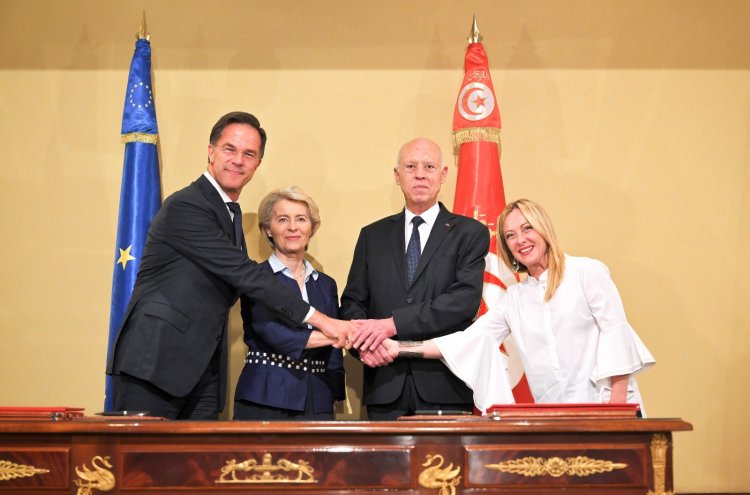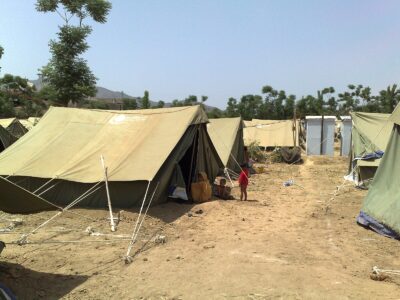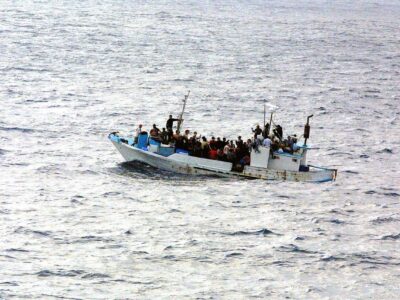28-09-2023
Mariana Mayor Lima
Middle East and Human Rights Researcher
Global Human Rights Defence
In the context of the implementation of a migration agreement between the European Union (“the EU”) and Tunisia, as part of the ‘comprehensive partnership package’, criticism from human rights activists is gaining prominence. [1] According to the head of the Tunisian Forum for Economic and Social Rights, Ramadan Ben Omar, the memorandum of this new agreement presents a clear bias in favour of the EU. [2] According to Omar, the agreement was problematic from the outset as it was signed in a context of lack of democratic principles, bearing in mind that the current Tunisian president, Kais Saied, has established an increasingly autocratic government since his “constitutional coup” in July 2021. [3]
According to human rights activists both in Europe and Africa, the migration agreement between the EU and Tunisia could seriously harm the security of the refugees and the exercise of the right to asylum. By analysing the legal aspects, especially refugee and asylum law, these critics argue that the EU-Tunisia pact could undermine international refugee protection obligations of both parties as outlined in the 1951 Refugee Convention and the 1967 Protocol -which eliminates the geographical and temporal limits that were part of the Convention originally- and the fundamental rights of migrants and refugees, as established by the Universal Declaration of Human Rights. [4]
As for the EU’s stance on human rights violations in Tunisia, it was not only highlighted by Ben Omar but also by Amnesty International, which warned about the EU’s unjustifiable silence on the issue. [5] Recently, numerous violations have been reported in the country, committed with the knowledge and, often, authorship, of the undemocratic Tunisian government. The head of the European division of the refugee rights organisation Pro Asyl, Karl Popp, highlighted:
“We see an EU partner spreading hate speech against sub-Saharan refugees […] We see that hundreds of people have been abandoned in the desert near Libya. A deal in these circumstances does not bode well. This is clearly an autocrat who intercepts people heading to Europe on boats.” [6]
In this sense, remaining silent in the face of such violations and providing financial support for such migration policy is likely to become a way of financially supporting such unlawful practices.
The European “migration crisis” of 2015 -as defined by the majority of the policy makers and the general public- provides a stark precedent of the complexities associated with irregular migration. [7] During this period, EU Member States faced an increase in the number of migrants and refugees, triggering discussions about migration policies and institutional xenophobia in Europe. Consequently, the EU’s pursuit of migration agreements with states such as Tunisia can be seen as an effort to prevent the recurrence of such a “crisis”. However, this new agreement, led by leaders such as Giorgia Meloni (Italy) and Mark Rutte (Netherlands) [8], who advocate stricter migration controls in their respective countries, appears to uphold the EU’s long-standing approach that began in 2015, which essentially aims to reduce the influx of migrants on the continent, even if this means placing them in a position of greater vulnerability, although now there is the pretext of protecting them from smugglers.
The representative of Pro Asyl, Karl Popp, told Deutsche Welle:
“If we want to combat people smugglers, we really need to offer legal pathways [for migration] […] But if we just create barricades, we will more likely encourage demand for the smuggling sector. The fight against human smuggling becomes, in reality, a fight against those who seek protection. It’s a way to ensure they never reach Europe.” [9]
As the EU prepares to provide financial support to Tunisia under the agreement, the debate on how to strike a balance between migration management and human rights considerations is intensifying. Activists argue that addressing irregular migration should not come at the expense of refugees’ human rights. [10] It is therefore fair to say that the EU’s attempt to manage migration while respecting international law and democratic values remains a challenge.
Sources and further reading
[1] Al Jazeera, ‘EU to start releasing money to Tunisia under migration pact’ (22 September 2023) <EU to start releasing money to Tunisia under migration pact> accessed 27 September 2023.
[2] DW, ‘EU-Tunisia migration deal: Encouraging the people smugglers?’ (21 July 2023) <https://www.dw.com/en/eu-tunisia-migration-deal-encouraging-the-people-smugglers/a-66286821> accessed 27 September 2023.
[3] Ibid.
[4] United Nations High Commissioner for Refugee, ‘THE REFUGEE CONVENTION, 1951’ (28 July 1951) <THE REFUGEE CONVENTION, 1951> accessed 28 September 2023; United Nations, ‘The Universal Declaration of Human Rights (UDHR)’, 10 December 1948 <Universal Declaration of Human Rights | United Nations> accessed 28 September 2023.
[5] Middle East Monitor, ‘Amnesty warns EU against its silence towards rights abuses in Tunisia’, 26 September 2023 <Amnesty warns EU against its silence towards rights abuses in Tunisia> accessed 27 September 2023.
[6] DW, ‘EU-Tunisia migration deal: Encouraging the people smugglers?’ (21 July 2023) <https://www.dw.com/en/eu-tunisia-migration-deal-encouraging-the-people-smugglers/a-66286821> accessed 27 September 2023.
[7] The Guardian, ‘What is the controversy over the EU migration deal with Tunisia?’ (18 September 2023) <What is the controversy over the EU migration deal with Tunisia?> accessed 27 September 2023.
[8] European Commission, ‘The European Union and Tunisia: political agreement on a comprehensive partnership package’ (16 July 2023) <The European Union and Tunisia> accessed 27 September 2023.
[9] Supra note 2.
[10] Supra note 2.








Comments